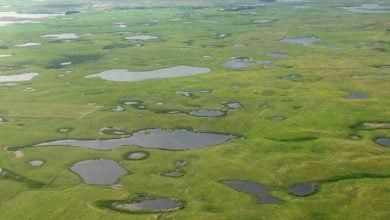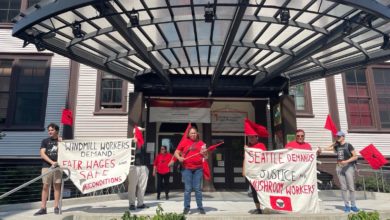Right now, the Seattle metropolitan region is shut down with a series of major snow events that are still ongoing. The Seattle area has accumulated three to eight inches of snow in most areas with more expected in coming days. To people in the Northeast or Midwest, this might not sound like a big deal, but it is.
Of course, for any region, cold and snowy winter weather hits homeless community members the hardest. On Feb. 7, Derek C. Johnson, who was thought to be homeless, died of exposure and was found dead at the Sodo Light Rail station in Seattle. As the current winter weather crisis develops, people living outdoors are at severe risk.
From a transportation perspective, eight inches of snow is a big deal in this region because municipalities do not plow or use melting products on streets that are not considered major thoroughfares. In other words, residential neighborhoods or “side streets” are for the most part left to their own devices when it snows. Combined with the many hills in this area, this leads to very unsafe driving conditions, both when the snow is fresh and later when it partially melts and refreezes or becomes packed down from some vehicles driving over it. While news footage of children sledding on steep hilly streets is cute, the reality is that those roads have been closed because they are completely unsafe to drive on.
Road conditions also impact public transit, with surface buses going on delayed snow schedules and snow routes. On Feb. 8, freeways became gridlocked mid afternoon as commuters attempted to get home before it became completely impossible to drive safely. On Feb. 9, a Saturday, many workers rested at home or started to shovel sidewalks and driveways. Retail and restaurant employees scrambled to get in to work for weekend shifts, or faced forced days off for which they likely will not get paid.
People joke about Seattleites not knowing how to drive in the snow, and there is of course an element of truth in that. This is because local residents have had few opportunities to practice snow driving. The climate here has for recent known history been quite mild. Despite the northern latitude, winters are typically rainy, not snowy. However, when temperatures drop, precipitation manifests as snow. Given the trends of climate change meaning colder winters and hotter summers, we can only expect more snow in years to come.
Failing to remove snow or treat roads or sidewalks has serious safety consequences. Cars end up in ditches and pedestrians can be injured in slip and fall accidents. Those most likely to be out trying to travel are those least able to afford to miss work. Individualistic solutions are promoted that are not realistic for low-income workers, such as buying a four-wheel drive vehicle. This highlights that under capitalism, “natural” disasters impact workers and capitalists differently.
Socialists must have a program to address the problems of everyday living faced by workers. Under a planned socialist economy, the safety of workers and communities would be paramount.
A socialist government would determine how to assure access to essential services such as health care during a snow event, allowing non-essential services to temporarily close without penalizing the workers who are unable to work due to such closures.
A socialist government could mobilize the masses of able-bodied workers who are temporarily off work due to a snow crisis to check on their neighbors and work to clear sidewalks and driveways in their communities. Of course, a socialist government would guarantee housing for all–nobody would be living unsheltered during severe winter weather.
Under capitalism, socialists can fight for a more rational approach to snow that protects the interests of working people. Here are some ideas:
- Demand that corporations pay for comprehensive and proactive snow removal and road treatment. These corporations profit from the transportation infrastructure that brings in workers and customers–they should pay.
- While continuing to fight for deeply affordable housing, call on all cities to open as many low or no barrier emergency shelters as needed to save lives.
- In the event of snow related transit problems, we support allowing all those who can to work from home.
- Onsite workers who who are unable to safely travel to work should not be penalized and should have adequate “sick and safe” days to use for this purpose. Existing safe and sick day legislation should be updated and expanded to include snow days.
- Expand public transit and make it free.
- Support a comprehensive program to stop and reverse catastrophic climate change.






